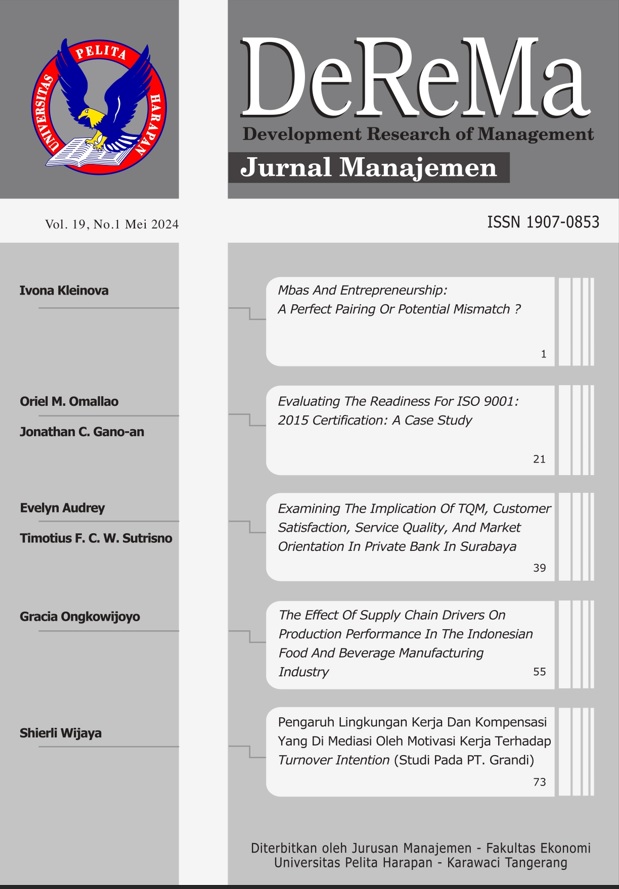EXAMINING THE IMPLICATION OF TQM, CUSTOMER SATISFACTION, SERVICE QUALITY, AND MARKET ORIENTATION IN PRIVATE BANK IN SURABAYA
DOI:
https://doi.org/10.19166/derema.v19i1.7314Keywords:
Total Quality Management, Service Quality, Market Orientation, Customer Satisfaction, Banking IndustryAbstract
Total Quality Management (TQM) has gained significant attention across various industries as a concept to enhance organizational performance, including in banking industry. This research paper aims to investigate the implementation and impact of TQM principles in the banking industry, exploring its essential indicators including service quality, market orientation, and customer satisfaction. The study begins by reviewing the existing literature on TQM and its application in the banking industry, highlighting key concepts, methodologies, and discussion. Empirical data was taken from 185 bank workers in East Java Region of the Republic of Indonesia, especially Surabaya City. This study uses Confirmatory Factor Analysis to test construct reliability and validity, while the relationship between variables is examined with Partial Least Square/ PLS-SEM. This research uses purposive sampling, we are targeting private bank workers in Surabaya through online questionnaires spread by social media. This research contributes to the existing body of knowledge by providing a comprehensive review and analysis of TQM implementation in the banking industry. This research findings demonstrate that TQM has a significant relationship with Customer Satisfaction, Service Quality, and Market Orientation.
Abstrak dalam Bahasa Indonesia. Manajemen Mutu Total (TQM) telah mendapatkan perhatian signifikan di berbagai industri sebagai konsep untuk meningkatkan kinerja organisasi, termasuk dalam industri perbankan. Makalah penelitian ini bertujuan untuk menyelidiki implementasi dan dampak prinsip-prinsip TQM di industri perbankan, mengeksplorasi indikator-indikator pentingnya termasuk kualitas layanan, orientasi pasar, dan kepuasan pelanggan. Studi ini dimulai dengan meninjau literatur yang ada tentang TQM dan aplikasinya dalam industri perbankan, menyoroti konsep-konsep kunci, metodologi, dan diskusi. Data empiris diambil dari 185 pekerja bank di Wilayah Jawa Timur Republik Indonesia, khususnya Kota Surabaya. Penelitian ini menggunakan Analisis Faktor Konfirmatori untuk menguji reliabilitas dan validitas konstruk, sementara hubungan antar variabel diperiksa dengan Partial Least Square/PLS-SEM. Penelitian ini menggunakan purposive sampling, kami menargetkan pekerja bank swasta di Surabaya melalui kuesioner online yang disebar melalui media sosial. Penemuan penelitian ini berkontribusi pada tubuh pengetahuan yang ada dengan memberikan tinjauan dan analisis yang komprehensif tentang implementasi TQM di industri perbankan. Temuan penelitian ini menunjukkan bahwa TQM memiliki hubungan yang signifikan dengan Kepuasan Pelanggan, Kualitas Layanan, dan Orientasi Pasar.
References
Ahmed, A. O., & Idris, A. A. (2021). Examining the relationship between soft total quality management (TQM) aspects and employees’ job satisfaction in “ISO 9001” Sudanese oil companies. TQM Journal, 33(1), 95-124. https://doi.org/10.1108/TQM-05-2019-0147
Al Khasabah, M. A. I., Salleh, H. S., Mat, N. H. N., & Zulkiffli, S. N. A. (2022). Nexus between total quality management and competitive advantage in Jordanian banking sector: The mediating effect of quality performance. Corporate Governance and Organizational Behavior Review, 6(2 Special Issue), 193-205. https://doi.org/10.22495/cgobrv6i2sip3
Banna, H., Ahmad, R., & Koh, E. H. Y. (2018). How does total quality management influence the loan quality of the bank? Total Quality Management and Business Excellence, 29(3-4), 287-300. https://doi.org/10.1080/14783363.2016.1180954
Bhuian, S. N. (1997). Exploring market orientation in banks: An empirical examination in Saudi Arabia. Journal of Services Marketing, 11(5), 317-328. https://doi.org/10.1108/08876049710176006
Brasileiro, B., & Vidal Barbosa, F. (2009). Proposta de escala para the customer value structure in the Brazilian personal retail banking market. 2, 310-327. http://www.anpad.org.br/rac
Chuah, S. H. W., Marimuthu, M., Kandampully, J., & Bilgihan, A. (2017). What drives Gen Y loyalty? Understanding the mediated moderating roles of switching costs and alternative attractiveness in the value-satisfaction-loyalty chain. Journal of Retailing and Consumer Services, 36(December 2016), 124-136. https://doi.org/10.1016/j.jretconser.2017.01.010
Dandis, A. O., Wright, L. T., Wallace-Williams, D. M., Mukattash, I., Eid, M. A. H. &, & Cai, H. (Huifen). (2021). Cogent business & management enhancing consumers ’ self-reported loyalty intentions in Islamic banks: The relationship between service quality and the mediating role of customer satisfaction. Cogent Business & Management, 8(1). https://doi.org/10.1080/23311975.2021.1892256
Darman, D., Maulana, M. A., & Tope, P. (2021). Analisis perbandingan tingkat kesehatan Bank BUMN dan Bank BUMS di Indonesia. J-MKLI (Jurnal Manajemen Dan Kearifan Lokal Indonesia), 4(2), 92. https://doi.org/10.26805/jmkli.v4i2.112
Dubey, R., & Gunasekaran, A. (2015). Exploring soft TQM dimensions and their impact on firm performance: Some exploratory empirical results. International Journal of Production Research, 53(2), 371-382. https://doi.org/10.1080/00207543.2014.933909
Hussain, A., Hannan, A., & Shafiq, M. (2023). Exploring mobile banking service quality dimensions in Pakistan: A text mining approach. International Journal of Bank Marketing. https://doi.org/10.1108/IJBM-08-2022-0379
Ismanto, H., Widiastuti, A., Muharam, H., Pangestuti, I. R. D., & Rofiq, F. (2019). Perbankan dan literasi keuangan. Jakarta: Deepublish 2019
Jaworski, B .J., & Kohli, A. K. (1993). Orientation: Antecedents and consequences. Journal of Marketing, 57(3), 53-70. https://doi.org/10.1177/002224299305700304
Jin, J. Y., Kanagaretnam, K., & Lobo, G. J. (2011). Ability of accounting and audit quality variables to predict bank failure during the financial crisis. Journal of Banking and Finance, 35(11), 2811-2819. https://doi.org/10.1016/j.jbankfin.2011.03.005
Jumono, S., Sugiyanto, & Mala, C. M. F. (2019). Determinants of profitability in banking industry: A case study of Indonesia. International Journal of English Language and Literature Studies, 9(1), 91-108. https://doi.org/10.18488/journal.aefr.2019.91.91.108
Lepistö, K., Saunila, M., & Ukko, J. (2022). The impact of certification on the elements of TQM exploring the influence of company size and industry. International Journal of Quality and Reliability Management, 39(1), 30-52. https://doi.org/10.1108/IJQRM-11-2020-0362
Liu, H. (1995). Market orientation and firm size: An empirical examination in UK firms. European Journal of Marketing, 29(1), 57-71. https://doi.org/10.1108/03090569510075343
Mainardes, E. W., & Freitas, N. P. de. (2023). The effects of perceived value dimensions on customer satisfaction and loyalty: A comparison between traditional banks and fintechs. International Journal of Bank Marketing. https://doi.org/10.1108/IJBM-10-2022-0437
McKecnie, S., Ganguli, S., & Roy, S. K. (2011). Generic technology-based service quality dimensions in banking: Impact on customer satisfaction and loyalty. International Journal of Bank Marketing, 29(2), 168-189. https://doi.org/10.1108/02652321111107648
Narver, J. C., & Slater, S. F. (1990). The effect of a market orientation on business profitability. Journal of Marketing, 54(4), 20. https://doi.org/10.1177/002224299005400403
Nelloh, L. A. M., Santoso, A. S., & Slamet, M. W. (2019). Will users keep using mobile payment? It depends on trust and cognitive perspectives. Procedia Computer Science, 161, 1156-1164. https://doi.org/10.1016/j.procs.2019.11.228
Patel, R. J., & Siddiqui, A. (2023). Banking service quality literature: A bibliometric review and future research agenda. Qualitative Research in Financial Markets, 1997. https://doi.org/10.1108/QRFM-01-2022-0008
Ruekert, R. W. (1992). Developing a market orientation: An organizational strategy perspective. International Journal of Research in Marketing, 9(3), 225-245. https://doi.org/10.1016/0167-8116(92)90019-H
Samat, N., Ramayah, T., & Mat Saad, N. (2006). TQM practices, service quality, and market orientation: Some empirical evidence from a developing country. Management Research News, 29(11), 713-728. https://doi.org/10.1108/01409170610716025
Slater, S. F., & Narver, J. C. (2016). Does competitive environment moderate the market orientation-performance relationship ? American Marketing Association, 58(1), 46-55. https://doi.org/10.1177/002224299405800104
Supriyanto, A., Wiyono, B. B., & Burhanuddin, B. (2021). Effects of service quality and customer satisfaction on loyalty of bank customers. Cogent Business and Management, 8(1). https://doi.org/10.1080/23311975.2021.1937847
Susilawaty, L., & Nicola, N. (2020). Pengaruh layanan perbankan digital pada kepuasan nasabah perbankan. Jurnal Manajemen Maranatha, 19(2), 179-190. https://doi.org/10.28932/jmm.v19i2.2478
Sutrisno, T. F. C. W. (2019). Relationship between total quality management element, operational performance and organizational performance in food production SMEs. Jurnal Aplikasi Manajemen, 17(2), 285-294. https://doi.org/10.21776/ub.jam.2019.017.02.11
Talib, F., & Rahman, Z. (2010). Studying the impact of total quality management in service industries. International Journal of Productivity and Quality Management, 6(2), 249-268. https://doi.org/10.1504/IJPQM.2010.034408
Tomášková, E. (2009). The current methods of measurement of market orientation. European Research Studies Journal, 12(3), 135-150. https://doi.org/10.35808/ersj/236
Williams, S. W. (2001). The effectiveness of subject matter experts as technical trainers. Human Resource Development Quarterly, 12(1), 91-97. https://doi.org/10.1002/1532-1096(200101/02)12:1<91::AID-HRDQ7>3.0.CO;2-0
Zebal, M. A., & Saber, H. M. (2014). Market orientation in Islamic banks - a qualitative approach. Marketing Intelligence and Planning, 32(4), 495-527. https://doi.org/10.1108/MIP-08-2013-0138
Downloads
Published
Issue
Section
License
Authors who publish with this journal agree to the following terms:
1) Authors retain copyright and grant the journal right of first publication with the work simultaneously licensed under a Creative Commons Attribution License (CC-BY-SA 4.0) that allows others to share the work with an acknowledgement of the work's authorship and initial publication in this journal.
2) Authors are able to enter into separate, additional contractual arrangements for the non-exclusive distribution of the journal's published version of the work (e.g., post it to an institutional repository or publish it in a book), with an acknowledgement of its initial publication in this journal.
3) Authors are permitted and encouraged to post their work online (e.g., in institutional repositories or on their website). The final published PDF should be used and bibliographic details that credit the publication in this journal should be included.





